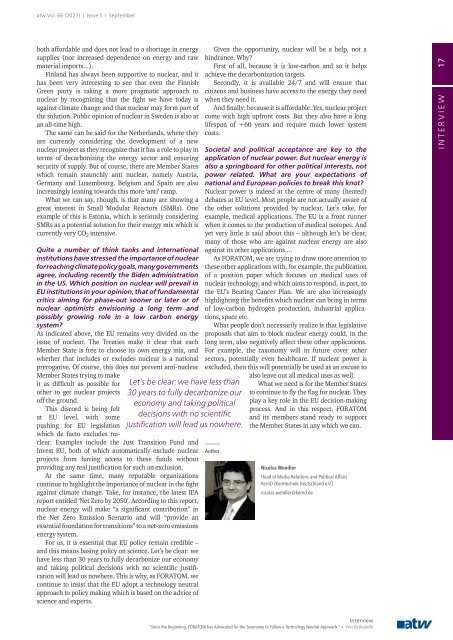atw - International Journal for Nuclear Power | 05.2021
Description Ever since its first issue in 1956, the atw – International Journal for Nuclear Power has been a publisher of specialist articles, background reports, interviews and news about developments and trends from all important sectors of nuclear energy, nuclear technology and the energy industry. Internationally current and competent, the professional journal atw is a valuable source of information. www.nucmag.com
Description
Ever since its first issue in 1956, the atw – International Journal for Nuclear Power has been a publisher of specialist articles, background reports, interviews and news about developments and trends from all important sectors of nuclear energy, nuclear technology and the energy industry. Internationally current and competent, the professional journal atw is a valuable source of information.
www.nucmag.com
You also want an ePaper? Increase the reach of your titles
YUMPU automatically turns print PDFs into web optimized ePapers that Google loves.
<strong>atw</strong> Vol. 66 (2021) | Issue 5 ı September<br />
both af<strong>for</strong>dable and does not lead to a shortage in energy<br />
supplies (nor increased dependence on energy and raw<br />
material imports...).<br />
Finland has always been supportive to nuclear, and it<br />
has been very interesting to see that even the Finnish<br />
Green party is taking a more pragmatic approach to<br />
nuclear by recognizing that the fight we have today is<br />
against climate change and that nuclear may <strong>for</strong>m part of<br />
the solution. Public opinion of nuclear in Sweden is also at<br />
an all-time high.<br />
The same can be said <strong>for</strong> the Netherlands, where they<br />
are currently considering the development of a new<br />
nuclear project as they recognize that it has a role to play in<br />
terms of decarbonizing the energy sector and ensuring<br />
security of supply. But of course, there are Member States<br />
which remain staunchly anti nuclear, namely Austria,<br />
Germany and Luxembourg. Belgium and Spain are also<br />
increasingly leaning towards this more ‘anti’ camp.<br />
What we can say, though, is that many are showing a<br />
great interest in Small Modular Reactors (SMRs). One<br />
example of this is Estonia, which is seriously considering<br />
SMRs as a potential solution <strong>for</strong> their energy mix which is<br />
currently very CO 2 intensive.<br />
Quite a number of think tanks and international<br />
institutions have stressed the importance of nuclear<br />
<strong>for</strong> reaching climate policy goals, many governments<br />
agree, including recently the Biden administration<br />
in the US. Which position on nuclear will prevail in<br />
EU institutions in your opinion, that of fundamental<br />
critics aiming <strong>for</strong> phase-out sooner or later or of<br />
nuclear optimists envisioning a long term and<br />
possibly growing role in a low carbon energy<br />
system?<br />
As indicated above, the EU remains very divided on the<br />
issue of nuclear. The Treaties make it clear that each<br />
Member State is free to choose its own energy mix, and<br />
whether that includes or excludes nuclear is a national<br />
prerogative. Of course, this does not prevent anti-nuclear<br />
Member States trying to make<br />
it as difficult as possible <strong>for</strong><br />
other to get nuclear projects<br />
off the ground.<br />
This discord is being felt<br />
at EU level, with some<br />
pushing <strong>for</strong> EU legislation<br />
which de facto excludes nuclear.<br />
Examples include the Just Transition Fund and<br />
Invest EU, both of which automatically exclude nuclear<br />
projects from having access to these funds without<br />
providing any real justification <strong>for</strong> such an exclusion.<br />
At the same time, many reputable organizations<br />
continue to highlight the importance of nuclear in the fight<br />
against climate change. Take, <strong>for</strong> instance, the latest IEA<br />
report entitled ‘Net Zero by 2050’. According to this report,<br />
nuclear energy will make “a significant contribution” in<br />
the Net Zero Emission Scenario and will “provide an<br />
essential foundation <strong>for</strong> transitions” to a net-zero emissions<br />
energy system.<br />
For us, it is essential that EU policy remain credible –<br />
and this means basing policy on science. Let’s be clear: we<br />
have less than 30 years to fully decarbonize our economy<br />
and taking political decisions with no scientific justification<br />
will lead us nowhere. This is why, as FORATOM, we<br />
continue to insist that the EU adopt a technology neutral<br />
approach to policy making which is based on the advice of<br />
science and experts.<br />
Let’s be clear: we have less than<br />
30 years to fully decarbonize our<br />
economy and taking political<br />
decisions with no scientific<br />
justification will lead us nowhere.<br />
Given the opportunity, nuclear will be a help, not a<br />
hindrance. Why?<br />
First of all, because it is low-carbon and so it helps<br />
achieve the decarbonization targets.<br />
Secondly, it is available 24/7 and will ensure that<br />
citizens and business have access to the energy they need<br />
when they need it.<br />
And finally: because it is af<strong>for</strong>dable. Yes, nuclear project<br />
come with high upfront costs. But they also have a long<br />
lifespan of +60 years and require much lower system<br />
costs.<br />
Societal and political acceptance are key to the<br />
application of nuclear power. But nuclear energy is<br />
also a springboard <strong>for</strong> other political interests, not<br />
power related. What are your expectations of<br />
national and European policies to break this knot?<br />
<strong>Nuclear</strong> power is indeed at the centre of many (heated)<br />
debates at EU level. Most people are not actually aware of<br />
the other solutions provided by nuclear. Let’s take, <strong>for</strong><br />
example, medical applications. The EU is a front runner<br />
when it comes to the production of medical isotopes. And<br />
yet very little is said about this – although let’s be clear,<br />
many of those who are against nuclear energy are also<br />
against its other applications....<br />
As FORATOM, we are trying to draw more attention to<br />
these other applications with, <strong>for</strong> example, the publication<br />
of a position paper which focuses on medical uses of<br />
nuclear technology, and which aims to respond, in part, to<br />
the EU’s Beating Cancer Plan. We are also increasingly<br />
highlighting the benefits which nuclear can bring in terms<br />
of low-carbon hydrogen production, industrial applications,<br />
space etc.<br />
What people don’t necessarily realize is that legislative<br />
proposals that aim to block nuclear energy could, in the<br />
long term, also negatively affect these other applications.<br />
For example, the taxonomy will in future cover other<br />
sectors, potentially even healthcare. If nuclear power is<br />
excluded, then this will potentially be used as an excuse to<br />
Author<br />
also leave out all medical uses as well.<br />
What we need is <strong>for</strong> the Member States<br />
to continue to fly the flag <strong>for</strong> nuclear. They<br />
play a key role in the EU decision-making<br />
process. And in this respect, FORATOM<br />
and its members stand ready to support<br />
the Member States in any which we can.<br />
Nicolas Wendler<br />
Head of Media Relations and Political Affairs<br />
KernD (Kerntechnik Deutschland e.V.)<br />
nicolas.wendler@kernd.de<br />
INTERVIEW 17<br />
Interview<br />
“Since the Beginning, FORATOM has Advocated <strong>for</strong> the Taxonomy to Follow a Technology Neutral Approach.” ı Yves Desbazeille

















